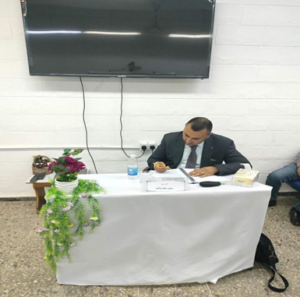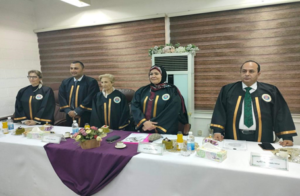Environmental Engineering Department at the College of Engineering, University of Baghdad, held MSc thesis examination titled:
“Sustainable Path for Biogas Production from Petroleum Oily Sludge by Anaerobic Co-Digestion Process Followed by Reusing the Residual Digestate in Concrete Mix”
By the student Hassan Saad Jassim and supervised by Prof. Dr. Zainab Ziad Ismail. The examination committee consisted of Prof. Dr. Shahlaa Esmail Ebrahim as Chairman, and the membership of Assistant Professor Mona Youssef Abdel-Ahad and Dr. Muhammad Bahgat Abdel-Karim. After conducting the public discussion and listening to the student’s defense, the thesis was accepted with excellent degree. The researcher published two papers within the Clarivate and Scopus, and a local paper in the Journal of the College of Engineering, University of Baghdad. The thesis was summarized as follows:
In general, petroleum industries including exploration, extraction, transport and refinery processes lead to the generation of hazardous toxic waste material in significant amounts. Oily sludge represents one of the most hazardous types of petroleum waste materials. This study was devoted to investigate the potential of biogas recovery by anaerobic co-digestion of real samples of petroleum refinery oily sludge (ROS) obtained from Al-Daura refinery. The effect of two major parameters which influence the biogas recovery were considered in this investigation as follows; (1) The temperature conditions including mesophilic (at 37°C) and thermophilic conditions at (55°C and 62°C), and (2) The type of inoculums (co-substrate) including cow dung (CD), cattle manure (CM), and poultry manure (PM). The experimental work involved setting up (24) biodigesters operated in a batch mode and strict anaerobic condition. The biodigesters were classified into three groups based on the temperature conditions, each group consisted of four digesters in duplicate. The biogas recovery was individually assessed in four components which were; (1) ROS (the control), (2) ROS + CD, (3) ROS + CM, and (4) ROS+ PM. The results demonstrated that the biogas production was the highest in the (ROS+PM) mix at all temperature conditions. The biogas production from (ROS+PM), (ROS+CM), and (ROS+CD) mixes exceeded its production from the control (ROS) by 67.5 %, 22.13 %, 21.6% at 37°C, and 63.6 %, 30.5%, 34.1%, at 55°C, and 67.14%, 9.39%, 19.03 % at 62°C, respectively. Modified Gompertz model was applied to describe the kinetic of the co-digestion process. The predicted and experimental results of biogas generation were fitted well with coefficients of determination > 0.96 indicating appropriate and favorable conditions of the co-digestion process. To ensure achieving the Product Life Cycle as well as the feasibility and sustainability of the suggested approach for the oily sludge management, the liquid residual digestate (LRD) was recycled and reused to replace fresh water in concrete mixes. Based on the water/cement (W/C) ratios which were 0.45, 0.50, and 0.55, three different types of LRD-modified concrete mixtures were prepared. The results of testing the fundamental properties of concrete mixes including the slump (workability), compressive strength, flexural strength, and dry density at 28 days curing, as well as leaching test after 90 days curing demonstrated a potential option for proper management and getting rid of the residual digestate by recycling the LRD to replace the fresh water in concrete mixes, in particular the lightweight concrete. In general, the total results of (156) assays and (2080) tests carried out in this study revealed a sustainable safe approach for dealing with hazardous petroleum refinery oily sludge.









No comment